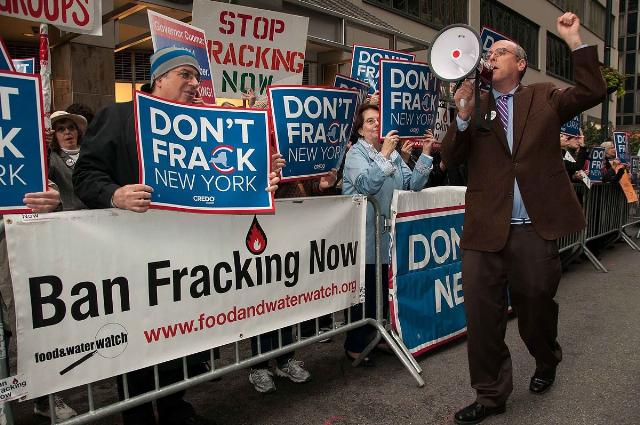Kamala and fracking
Back during her first run for the presidency in 2020 -- an effort that went so poorly her campaign didn’t even make it to the calendar year 2020, then-senator Kamala Harris (D-CA) said in a CNN Climate Crisis Town Hall that she was in favor of banning the practice of hydraulic fracturing, commonly known as “fracking.” There was, to quote her, “no question” she was “in favor of banning fracking.”
Fast forward almost five years and in her second run for the White House, now-vice president Kamala Harris has said, at least via her campaign representatives, that she is no longer in favor of banning the practice.
Why has this happened? What changed? How has Harris done a complete 180 on this issue? And how can we trust that what she is now saying is true, or if it’s just lip service she’s paying to get her through November 5 without losing the 19 critical electoral college votes of the swing state and fracking powerhouse that is the commonwealth of Pennsylvania?
It would be nice to get some clarity on this issue from her but, as of this writing one week deep into August, the candidate herself has not taken a single question from any member of the media on any issue, let alone one on fracking. More than a fortnight into her campaign, and we haven’t heard from her on literally anything at all.
It’s imperative we know more about Harris’ about-face on fracking. I’m not holding my breath, of course, but journalists need to seriously engage her on this issue to help verify whether she is indeed telling us the truth.
Perhaps she fell off her ass on the road to Damascus? Unlikely, but not outside the realm of possibility.
Maybe she’s looked at the issue more closely in the ensuing time period and come to the conclusion that fracking is actually a safe and responsible manner of extracting oil and natural gas and attempting to ban the practice would be economic suicide.
I mean, it could have happened. She could have read The Heartland Institute’s Debunking Four Persistent Myths About Hydraulic Fracturing policy brief, which goes into great detail on how fracking isn’t giving people cancer or poisoning their drinking water or polluting the air or causing the ground to shake.
Or maybe she saw the report from the Global Energy Institute at the U.S. Chamber of Commerce that showed how, if Harris had gotten her way and banned fracking in 2021, the impact would have been the elimination of 19 million jobs by 2025, a $7.1 trillion decline in U.S. gross domestic product (GDP), a $1.9 trillion decline in combined federal, state, and local tax revenue, a doubling in the price of gasoline, and a 324 percent increase in the price of natural gas.
Or, with at least one wary eye trained on Pennsylvania, maybe she flipped through an analysis from the American Petroleum Institute and saw fracking directly or indirectly supported more than 480,000 jobs in the Keystone State, just over 6 percent of its total employment, provided $40.5 billion in labor income, and, at $78.4 billion in total, made up nearly 10 percent of its GDP.
There is a third possibility -- and if I may be so uncharitable, the strongest one -- that she’s just saying what she needs to quiet an issue that has the potential to derail her candidacy.
I may not be being very fair to her, but until she goes into more substantive detail as to why she has changed her mind on fracking, I’m going to treat this as just another of her many campaign flip-flops designed to moderate her appearance and deflect from her record as one of the most liberal human beings in the United States Senate.
This is why we need the press to press her on this. Fracking is an issue of too much importance for the country to be trusted with someone as flippant and ignorant about it as the 2019-version of Kamala Harris was.
Where does Kamala Harris really stand? Let’s try and get some substantive answers.
Tim Benson (tbenson@heartland.org) is the senior policy analyst at The Heartland Institute, a national, free-market think tank headquartered in Arlington Heights, Illinois.

Image: Adam S. Welz
FOLLOW US ON
Recent Articles
- Not in Kansas Any More
- Democrats Dying on the Most Desolate Hills
- If She’s an Astronaut … I’m a Jet Fighter Pilot
- Is the Jihadist Trojan Horse Winning?
- Who Has the Best American Autobiography?
- This Easter, Let Us Renew Our Faith
- Is it Time to Ignore the Judiciary?
- Higher Ed is Fighting Back!
- Easter: the Resurrection of Jesus Transformed the World Forever
- Trump’s vision for technological greatness
Blog Posts
- Hillary ‘the Russia Hoaxer’ Clinton wants to imprison people for ‘propaganda’
- Rep. Jamie Raskin threatens foreign leaders who cooperate with President Trump with repercussions, 'when we come back to power — and we will'
- Maybe we need more living versions of “Hillbilly Funerals”
- A female fencer's courage is partly rewarded
- Democrats' Cloward-Piven default
- A New Mexico judge resigned over allegations that he kept a Tren de Aragua member in his home
- The Pope’s death is leading to yet more anti-Israel and anti-Trump propaganda
- Ivy League college invites antisemitic rapper onto campus
- Pope Francis, RIP
- It’s not really about Abrego Garcia
- When Oregon became Bart Jason
- Post-election lawfare; legislating from the bench
- Oregon pushes trans track
- The Starliner: worse than we thought
- Professional sports leagues push gun control






